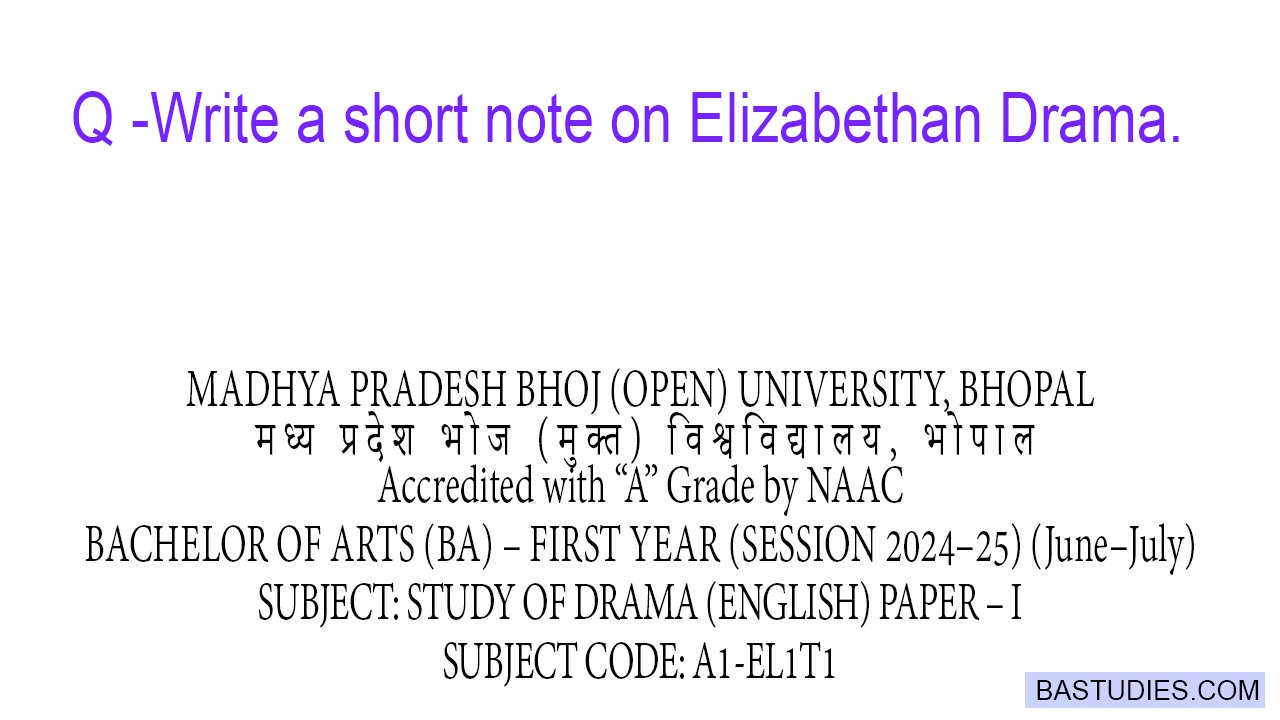Write a short note on Elizabethan Drama
B.A. First Year – Study of Drama (English), Paper – I | Subject Code: A1-EL1T1.
Q- Write a short note on Elizabethan Drama
ANSWER –
Short Note on Elizabethan Drama
Introduction
Elizabethan Drama refers to the body of English plays written and performed during the reign of Queen Elizabeth I (1558–1603) and extending slightly into the early 17th century. It is considered the golden age of English theatre and marked a significant transformation in dramatic literature. During this time, drama evolved from the religious morality plays of the Middle Ages into complex works that explored human emotion, politics, love, power, ambition, and the supernatural.
Historical Background
The Elizabethan era was a period of relative peace, economic growth, and cultural flourishing in England. The Renaissance had reached England, bringing with it a renewed interest in classical learning, humanism, and the arts. Queen Elizabeth I was a great patron of the arts and literature, and under her rule, theatre flourished as never before.
Public theatres began to appear and thrive. The first permanent theatre, known simply as “The Theatre,” was built in 1576 by James Burbage. This was followed by others like The Globe, The Rose, and The Swan, which became the primary venues for the performance of plays. These theatres attracted large audiences from all social classes, making drama a truly popular form of entertainment.
Major Characteristics of Elizabethan Drama
-
Influence of Classical Drama:
Elizabethan playwrights were greatly influenced by classical Roman and Greek plays. They borrowed ideas related to tragic structure, chorus, and themes from writers like Seneca, Plautus, and Aristotle. However, they also broke many classical rules and created a new, flexible form of drama. -
Use of Blank Verse:
A major feature of Elizabethan drama was the use of blank verse (unrhymed iambic pentameter). This poetic form allowed for greater expression and flow in dramatic dialogue. The rich, rhythmic language added beauty, intensity, and depth to the characters and themes. -
Mixture of Genres:
Elizabethan plays often combined elements of tragedy, comedy, and history in a single play. Unlike classical drama, which kept these genres separate, Elizabethan playwrights created complex plots that balanced humor and seriousness. -
Focus on Human Emotions and Ambitions:
Elizabethan drama focused on exploring the full range of human emotions — love, hatred, jealousy, ambition, revenge, and guilt. The characters were often psychologically complex and driven by inner conflict. -
Use of Supernatural Elements:
Many Elizabethan plays included ghosts, witches, magic, and other supernatural elements. These were used not only for entertainment but also to explore deeper philosophical and moral questions. -
Absence of Female Actors:
During this period, women were not allowed to perform on stage. All female roles were played by young boys or men, often with high-pitched voices and delicate appearances. -
Political and Social Commentary:
Though censorship existed, many playwrights subtly criticized the society, politics, and monarchy of the time through symbolism, historical parallels, and allegory. The drama often reflected the anxieties and tensions of Elizabethan society.
Major Playwrights of Elizabethan Drama
-
William Shakespeare (1564–1616):
Widely regarded as the greatest playwright in the English language, Shakespeare wrote tragedies (Hamlet, Macbeth, Othello), comedies (Twelfth Night, As You Like It, A Midsummer Night’s Dream), and histories (Henry IV, Richard III). His characters are known for their psychological depth, and his language is celebrated for its poetic richness. -
Christopher Marlowe (1564–1593):
Marlowe was a pioneer of blank verse and a major influence on Shakespeare. His famous plays include Doctor Faustus, Tamburlaine, and The Jew of Malta. His protagonists are often ambitious overreachers who challenge divine authority. -
Ben Jonson (1572–1637):
Known for his satirical comedies, Jonson’s plays like Volpone and The Alchemist criticized the corruption and greed of society. He also introduced the concept of the “comedy of humours.” -
Thomas Kyd (1558–1594):
Kyd is best known for The Spanish Tragedy, a revenge tragedy that influenced Shakespeare’s Hamlet. His work was full of violence, intense emotion, and sensational themes. -
John Webster, Thomas Dekker, Thomas Middleton:
These playwrights contributed significantly to the development of Jacobean drama, which followed the Elizabethan period but retained many of its themes and styles.
Themes of Elizabethan Drama
-
The Struggle between Good and Evil
-
Ambition and the Fall of Man
-
Love and Betrayal
-
Political Power and Corruption
-
Fate and Free Will
-
Appearance vs. Reality
-
Revenge and Justice
These themes were explored with a richness of language and dramatic intensity that captured the imagination of audiences then—and continues to inspire even today.
Conclusion
Elizabethan drama represents a high point in the history of English literature. With its bold themes, poetic expression, and psychological depth, it laid the foundation for modern drama. The playwrights of this period, especially William Shakespeare and Christopher Marlowe, revolutionized the art of storytelling and theatrical performance. Their works continue to be studied, performed, and celebrated around the world for their universal appeal and timeless relevance.
READ ALSO – Give a brief character sketch of Mephistopheles in Dr Faustus
READ ALSO – Write a short note on Greek Tragedy
MORE Q&A – STUDY OF DRAMA

1 thought on “Write a short note on Elizabethan Drama”